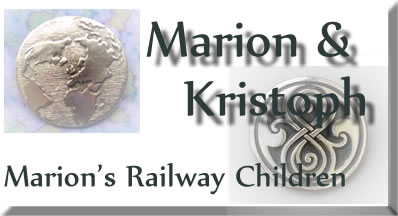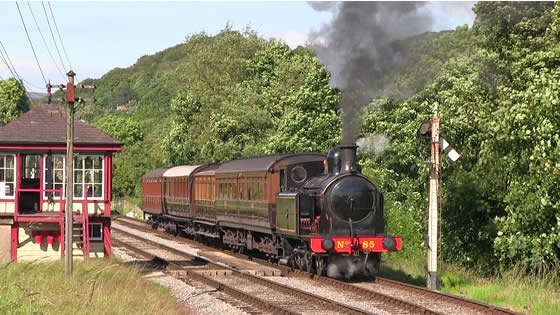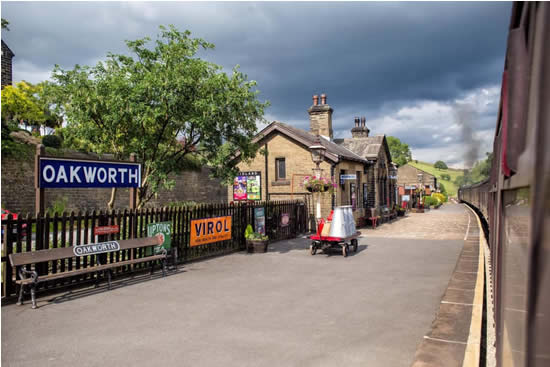

With the month of Octima, autumn had set in with a vengeance on the Southern Plain of Gallifrey. Blustery winds and rain battered it daily. The children Gallis Limmon brought to the makeshift school in Marion’s white drawing room compared it to the cold, bitter Yorkshire Moors they had heard about when Marion read The Secret Garden to them.
She read them another story as the wind-driven rain rattled against the windows and they sat, snug and warm, by the fireside. Then, since she was married to a Time Lord and his duties as Lord High President were light at present, she arranged for a trip that got them all away from the miserable autumn weather for a day.
It was warm and sunny in Yorkshire. The children appreciated that thoroughly. They appreciated their visit to another planet, too. They looked up at the unusual blue sky almost as much as they looked around the railway station and at the train that they were shortly to board. They chattered excitedly to each other in their native Gallifreyan.
“They’re Romanian orphans,” Marion said to a woman who had expressed her curiosity about where they all came from. “We’re giving them a holiday in the UK.”
“Oh, bless you,” the woman replied. “That’s a wonderful thing to do. I hope they have a nice time.”
“For a blatant lie like that, I think you should donate a couple of your personal collection of diamonds to an organisation that really gives holidays to Romanian orphans,” Kristoph told her.
“I’ll do that,” Marion promised. “Look, the train has steam up. It’s ready for boarding.”
It wasn’t just any train. It was the LMS 0-6-0T Class 3F, with the name ‘Jinty’ inscribed on a brass plate that stood out from the glossy black. That name was a strange, foreign one to Marion’s students and they repeated it over and over as they walked past the locomotive and its firebox and guards van before climbing aboard the late Edwardian carriage behind it. The carriage was divided into compartments, each sitting up to eight people comfortably, so Marion took seven of her students with her into one compartment, while Kristoph took another group, and Gallis Limmon with his sister, Misha, head librarian, were in charge of the others. There was a little bit of fuss about who got the window seats but everyone was sitting down comfortably before the locomotive let off a piercing whistle. There were a series of bumps as forces of inertia made the carriages bang against their buffers before the train began to move forward slowly and smoothly away from the platform at Keighley in North Yorkshire, along the famous Worth Valley Railway.
Marion didn’t have a window seat. She gave that privilege up to the children. But she could see the view very well from where she was sitting. The train ran for a while through the town of Keighley, mostly along the backs of red-brick terraced houses with a fence separating their back yards from the tracks. The terraced houses gave way to more substantial suburban houses with bigger gardens, patios and gazebos. Then they were in the countryside, the steam train making a delightful chuffing noise and the occasional whistle as it entered the Worth Valley itself, following the line of the river that had carved its way through the hills in prehistory. It was a wide valley, but even so, the children who had been born and raised on the Southern Plain, where they could see for hundreds of miles in any direction, were surprised to be hemmed in by green slopes on either side. They stood at the wide open window and looked up at the blue sky above the valley, just be sure that it was still there.
“What are those?” one of the youngest of the children asked, pointing to the white dots on the slopes.
“Sheep,” Marion replied. “Don’t you know....”
But of course, many of them didn’t. There was an animal that was domesticated on the farms of the Southern Plain for the woolly coat it shed twice yearly, but it was much bigger and a dark brown colour. Marion pictured a flock of sheep in her head, and her young students made hologram images of them to look close up. Then they lost interest in sheep as the train pulled into the first station on the route. They watched as a half a dozen people got out of a carriage further down the train and three others got on. The train moved off again with the evocative rattle of the wheels on the track, the hiss of steam and the hoot of the whistle. Marion breathed in the smell of steam and thought about a much longer journey she and Kristoph had taken a few years ago, on the Orient Express across Europe. But this short trip was just as pleasant, and it was all completely new to her students.
The train stopped again, this time at the village of Damems, considered to be the smallest railway station in Britain. Again a few people got on and off. This fascinated the children. Marion really couldn’t understand why. She had explained the idea of trains to them when she read the book to them.
As they approached the next station, they had a real surprise. A group of walkers on the road running beside the railway track stopped and waved at the train. The children waved back enthusiastically.
“Just like the story,” the children said excitedly. “People waving to the train.”
Marion smiled. When she had read The Railway Children to them they had questioned many aspects of the plot. They had not even understood, at first, what a train was. And when she had explained how they worked, and the difference between steam, diesel and electric trains, she then had to explain why people used them to travel.
But the one thing they had grasped was the idea of waving. They had wholeheartedly enjoyed the parts of the story where the children waved at the train and people on it had waved back. And now they were on the train and they were waving to people.
Not just her group in this carriage, either. They told her that all the children in three whole carriages were doing it, and they kept on doing it all the way to the next station.
And this station almost blew their minds away, because the book Marion had read from had a photograph of Oakworth station in it, and now they were looking at it for real. In some ways, it seemed incredible that these children who lived on a planet that had all kinds of technology beyond the imagination of humans should be so impressed. But they were. They pointed out to each other the Victorian station house built of warm sandstone that was blackened by a century of soot. They admired the advertisements for old fashioned products like Pears soap and Cadbury’s chocolate that adorned the wooden fence, the tall iron lampposts with gas lanterns at the top and even the sign pointing to parking for ‘horseless carriages only’. They didn’t understand the joke since they didn’t really know what horses were, but they liked the sign, anyway.
When the train pulled out of the station again they all waved enthusiastically to the station master in authentic Edwardian uniform. He graciously waved back.
Many people waved. Marion wondered why those who lived and worked in the area didn’t get bored with doing that, since it was likely that tourists on the trains waved from every train that went past. But they didn’t. They kept on waving, and the children of Gallifrey were thrilled to bits by the experience.
There was one more station, yet, Haworth. Again, it was a charming sight, made to look like a 1950s station with hanging baskets and advertisements for seaside resorts on the Yorkshire coast. Marion wondered if Kristoph was thinking the same things she was thinking about the advertisement for Whitby.
Then another short trip along the valley to the end of the line at Oxenhope. There, everyone alighted, disappointed to come to the end of their journey, but reassured that they would have to go back by the same train later in the afternoon.
First, there was something even more welcome. Lunch. Kristoph took charge, first organising a headcount to make sure none of the youngsters had strayed, then leading them across the platform to the permanently stationed buffet car where sandwiches and cake with ice cold milk were followed by ice cream.
Marion sat with Kristoph and the other adults and drank coffee while watching and listening to the children’s chatter.
“Why is it that Gallifrey never had trains?” she asked. “I should have thought it would have been useful to have a transport system that linked all the towns of the Southern Plain.”
“There isn’t a square metre of the Southern Plain that doesn’t belong to one of the great Houses,” Kristoph answered. “And we’re a quarrelsome lot. We’d never agree who owned the line or the rolling stock, or how much a ticket should be. Besides, the people of those towns don’t really have any need to travel. Their work is usually within the same demesne as their homes. Their families would all be in the same place, too. Caretakers tend to marry within their local communities. They don’t tend to have relatives on other estates. And needless to say, we don’t have any seaside resorts to organise day trips, too.”
“Maybe there should be,” Marion pointed out. “Their lives are so restricted. These children are the only ones who have been away from Gallifrey unless it is to work on Karn or Polarfrey when they finish school. They should have more opportunities.”
“But, Marion,” Misha Limmon said to her. “The people are not unhappy. They don’t think of themselves as restricted. When their work is done they have the peace of the Southern Plain. And whoever owns the land, they are as free to walk upon the grass as anyone else. They have no need to travel.”
“They don’t know that they CAN,” Marion argued. “If they did… if they knew there was more to be seen…”
“They would start to demand more,” Kristoph said. “Marion, my dear, do you want all of our servants on strike for annual holiday allowances?”
“Would they need to strike?” Marion answered. “Wouldn’t you give them a small thing like that?”
“I would,” Kristoph admitted. “And I dare say Lily would be happy to do the same, and one or two others who are happily disposed towards the Caretakers of their demesne. But do you suppose Lord Ravenswode or Lord Arpexia, Lord Oakdaene would be so kind?”
Their Caretaker companions, Madam Malcuss and Misha and Gallis Limmon were all rather surprised to hear what amounted to a criticism of other Oldbloods from their own Lord and Master. Kristoph smiled reassuringly.
“There isn’t a day goes by that those three don’t hurl veiled insults at me on the floor of the Panopticon. They are the spearhead of the opposition to my proposals for Caretaker suffrage. If I introduced a proposal for mandatory holidays for the same Caretakers I think the three of them would spontaneously combust and burn the Citadel to the ground.”
Gallis Limmon tried to keep a straight face as the image coloured their imaginations. His sister and Madam Malcuss laughed softly.
“Things happen slowly on Gallifrey,” Kristoph reminded Marion. “Much slower than on Earth. Take this railway line. It was built in 1867 by the woollen mill owners of this valley, to transport their goods to Keighley and to transport their workers to the factories. Fifty years later it was transporting those workers on their annual holidays to the likes of Whitby and Scarborough. And now, a little less than a century on the mills are gone and it is a holiday destination in itself. Riding the old trains is a leisure activity for people with jobs in far off towns and cities. All that in the time it takes us to send our sons and daughters to the Academy to be educated. Imagine, even if we Oldbloods, the equivalent of those mill owners, decided that trains crossing the plains between our properties WAS a good idea – and by that we would mean a PROFITABLE idea, of course. How long would it be before those trains carried emancipated Caretakers to the Great Ocean for holidays? It wouldn’t be in your lifetime, Marion, my dear. I am not even sure it would be in mine.”
Marion understood what he was saying. But she still thought it was a pity. She glanced at the children who were enjoying a day trip away from their world by Kristoph’s kindness. As they ate their ice cream they were quoting memorised passages of The Railway Children to each other. She looked around and saw copies of the film on DVD for sale by the counter. Then she remembered that DVD didn’t exist on Gallifrey, either.
“You can buy that and show it to them in the TARDIS on the way home,” Kristoph told her. “As for your other thoughts… by the time your children are adults, stepping out into the best careers they can achieve, they should have that suffrage I am fighting for. With that, they will have the power to achieve whatever else they may want. That might be holidays at the seaside or it might be guaranteed free entry into the Academies for their children, or shares in the bounty from the mines that they work in. But the important thing is that they will get those things for themselves. I think you will agree that is better for them in the long run than being given these boons as the charity of their lords and masters.”
Marion nodded. In a subtle way Kristoph had been chastising her. She had forgotten that Gallifrey was a very different world to Earth. She imagined it was possible to apply her own Earth values to it.
“Besides,” Kristoph added. “I for one prefer a slow social revolution to a fast one. In the history of the galaxies, when the lower classes rise up and demand change all at once it never bodes well for the aristocrats, and as I AM an aristocrat, I find myself anxious to keep my head when revolution shakes the foundations of Gallifrey.”
Marion smiled at his grim joke. The Caretakers at the table didn’t fully understand his meaning. They smiled, too, but only out of politeness and respect to him.
“I think the ice cream is finished,” Kristoph added. “I suggest we all take a stroll in the fresh air of this lovely Yorkshire valley before tea time and our return journey on that train.”

 |
 |
 |